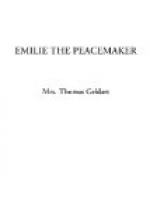tender-hearted, forgiving one another, as God for Christ’s
sake hath forgiven you,” then Emilie could not
rest. She did not forgive her aunt; she felt
that she did not; but Emilie was
human, and
human nature is proud. “I did nothing to
offend her,” reasoned pride, “it was only
because I was out a little late, and I said I was sorry
and I tried to bring her round. Ah well, it will
all be right to-morrow; it is no use to think of it
now,” and she prepared to kneel down to pray.
Just then her eye rested on her father’s likeness;
she remembered how he used to say, when she was a
child and lisped her little prayer at his knee, “Emilie,
have you any unkind thoughts to any one? Do you
feel at peace with all? for God says, ’When
thou bringest thy gift before the altar, and there
rememberest that thy brother hath aught against thee,
leave there thy gift before the altar,
first
be reconciled to thy brother, and
then go and
offer thy gift.’” On one or two occasions
had Emilie arisen, her tender conscience thus appealed
to, and thrown her arms round her nurse’s or
her aunt’s neck, to beg their forgiveness for
some little offence committed by her and forgotten
perhaps by them, and would then kneel down and offer
up her evening prayer. So Emilie hushed pride’s
voice, and opening her door, crossed the little passage
to her aunt’s sleeping room, and putting her
arm round her neck fondly said, “Dear aunt!”
It was enough, the good old lady hugged her lovingly.
“Ah, Emilie dear, I am a cross old woman, and
thou art a dear good child. Bless thee!”
In half an hour after the inmates of the little lodging
in High Street were sound asleep, at peace with one
another, and at peace with God.
CHAPTER THIRD.
THE LESSON AT THE COTTAGE.
Edith was very busily searching for corallines and
sea weeds, a few days after the evening walk recorded
in our first chapter. She was alone, for her
two sisters had appeared more than usually confidential
and unwilling for her company, and her dear teacher
was engaged that afternoon at the Young Ladies’
Seminary, so she tried to make herself happy in her
solitary ramble. A boat came in at this moment,
and the pleasant shout of the boatmen’s voices,
and the grating of the little craft as it landed on
the pebbly shore, attracted the young lady’s
notice, and she stood for a few moments to watch the
proceedings. Amongst those on shore, who had
come to lend a hand in pulling the boat in, Edith
thought that she recognised a face, and on a little
closer inspection she saw it was old Joe Murray, who
had stopped her course to the beach a few evenings
before. She did not wish to encounter Joe, so
slipping behind the blue jacketed crowd, she walked
quickly forwards, but Joe followed her.




